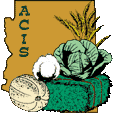 |
|
|
|

|
|||
| |
|||
Last spring, seed corn maggots (SCM) caused problems for growers in early plantings of melons and cotton. In some instances, significant stand reductions due to larvae feeding on germinating seed required a few fields to be replanted. Not only is this an inconvenience to the grower, but replanting is expensive and can disrupt harvest schedules. Unfortunately, once maggots have been found infesting the soil during stand establishment, there is usually nothing you can do. Thus, avoidance of the problem is the most effective way of preventing stand reductions (read more on SCM management). First, weather plays a major role in determining the damage potential for SCM to be a problem. Melon stands are more susceptible to SCM during wet, cold spring weather in which seed germination is slowed or delayed. These conditions give SCM a chance to develop in the soil and attack the seeds before they can emerge. Another important factor is SCM are attracted to fields with high levels of decomposing organic matter. This includes heavy plant residue remaining after harvest of the previous lettuce or cole crop, and applications of manure prior to planting. Growers would be encouraged not to plant melons into fields under these conditions. However if growers decide to plant in these conditions, then it would be wise to use a preventative insecticide applied at planting to minimize the impact from SCM and give seedling stands a fighting chance. A few alternatives are available that have shown activity against SCM and may be practical for SCM management in spring melons. Please see the publication Seed Corn Maggot Control With In-Furrow Sprays and Seed Treatments On Cantaloupes and Insecticide Alternatives for Preventative Seed Corn Maggot Control in Spring Melons. To contact John Palumbo go to: jpalumbo@ag.arizona.edu
|
|||
| Back | |||
For questions or comments on any of the topics please contact Marco Pena at the Yuma Agricultural Center. |
|||
| Home | Cotton
| Veggies | Forages
| Grains | Citrus
| Crop x Crop Insects | Diseases| Weeds | Pesticides | Economics | News | Weather | Research | Photos | Contacts | General Info. Copyright © 2001 University of Arizona, College of Agriculture and Life Sciences Webmaster: Al Fournier (acis@ag.arizona.edu) |
|||